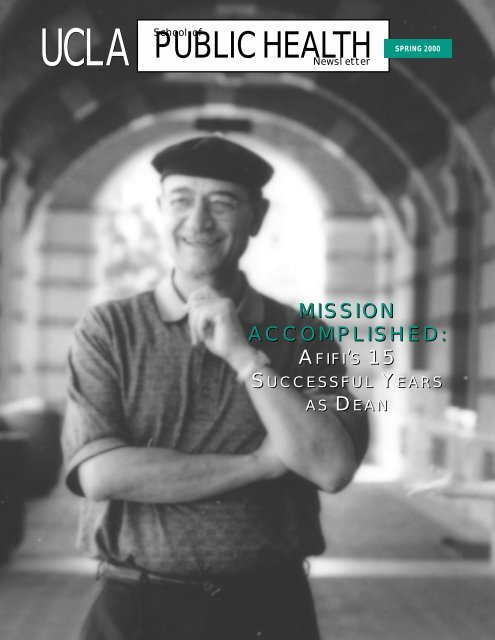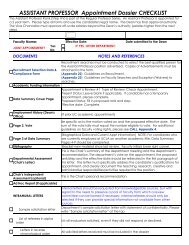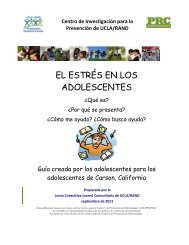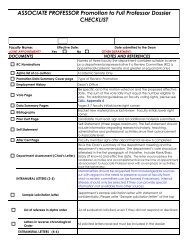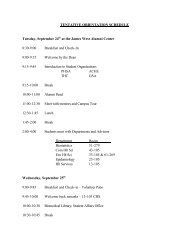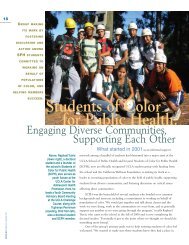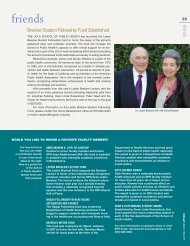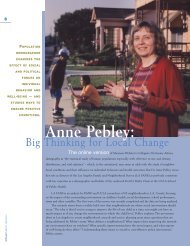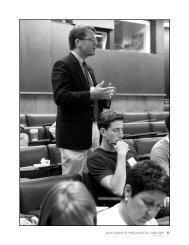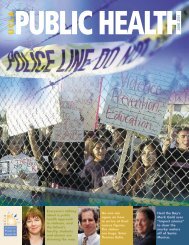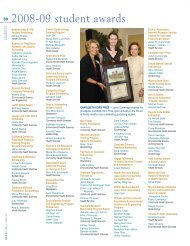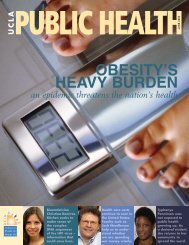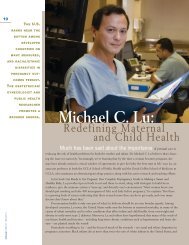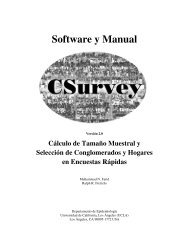UCLA PUBLICHEALTH SPRING 2000 - UCLA School of Public Health
UCLA PUBLICHEALTH SPRING 2000 - UCLA School of Public Health
UCLA PUBLICHEALTH SPRING 2000 - UCLA School of Public Health
You also want an ePaper? Increase the reach of your titles
YUMPU automatically turns print PDFs into web optimized ePapers that Google loves.
<strong>UCLA</strong><br />
<strong>School</strong><br />
PUBLIC<br />
<strong>of</strong><br />
HEALTH<br />
<strong>SPRING</strong><br />
Newsletter<br />
<strong>UCLA</strong><br />
<strong>2000</strong><br />
MISSION<br />
ACCOMPLISHED:<br />
AFIFI’S 15<br />
SUCCESSFUL YEARS<br />
AS DEAN
CHILDREN’S ADVOCATE ROB REINER CHOSEN<br />
TO DELIVER KEYNOTE AT SPH COMMENCEMENT<br />
DEAN’S MESSAGE<br />
It is with mixed emotions that I<br />
write my last message as dean <strong>of</strong> the<br />
<strong>UCLA</strong> <strong>School</strong> <strong>of</strong> <strong>Public</strong> <strong>Health</strong>. On a<br />
personal level, it has been a wonderful<br />
experience to play a role in the<br />
success <strong>of</strong> our school and to know<br />
that we are contributing to a healthier<br />
society. But after 15 years in this<br />
position, I have achieved the goals I<br />
established for the school, and it is<br />
time for a new dean to take the helm.<br />
I would like to express my sincerest<br />
thanks to the entire constituency<br />
<strong>of</strong> our school — faculty, students,<br />
staff, alumni and our many friends<br />
in the community. The school’s<br />
strength lies in your remarkable<br />
talents, your commitment to the<br />
principles <strong>of</strong> public health and your<br />
dedication to seeing these principles<br />
through. Any success I have enjoyed<br />
is a reflection <strong>of</strong> that strength.<br />
Now I look forward to joining you<br />
as a loyal member <strong>of</strong> our school’s<br />
constituency. I pass along the reins<br />
secure in the knowledge that the<br />
<strong>UCLA</strong> <strong>School</strong> <strong>of</strong> <strong>Public</strong> <strong>Health</strong> will<br />
continue to soar to new heights.<br />
Abdelmonem A. Afifi, Ph.D.<br />
Rob Reiner<br />
Actor, director and children’s advocate<br />
Rob Reiner has accepted<br />
an invitation to be the keynote<br />
speaker at the <strong>2000</strong> <strong>UCLA</strong> <strong>School</strong><br />
<strong>of</strong> <strong>Public</strong> <strong>Health</strong> Commencement.<br />
Among Reiner’s many activities on<br />
behalf <strong>of</strong> children, he served as chair<br />
for the campaign <strong>of</strong> Proposition 10, the<br />
California Children and Families Initiative.<br />
The ballot measure — proposing a<br />
50-cent-per-pack cigarette tax that<br />
would be used to create, on a countyby-county<br />
basis, a comprehensive, integrated<br />
program <strong>of</strong> early-childhood development<br />
services — was approved by<br />
voters in 1998 and is currently being implemented<br />
by the California Children<br />
and Families First State Commission.<br />
Reiner was appointed by Gov. Gray<br />
Davis to chair the commission, which is<br />
BELOVED LONG-TIME STAFFER SAM LUCAS IS MOURNED<br />
Sam Lucas, one <strong>of</strong> the school’s most beloved employees,<br />
died in April after a sudden illness. He<br />
was 46.<br />
Lucas served the school for 20 years, the last<br />
five as building manager. “Every <strong>UCLA</strong> <strong>School</strong> <strong>of</strong><br />
<strong>Public</strong> <strong>Health</strong> student, staff and faculty member<br />
for the past 20 years knew Sam,” says Dorothy<br />
Breininger, executive assistant to the dean.<br />
Lucas was well known for his dedication to<br />
the school. “He would brave high winds in his T-<br />
shirt hanging signs announcing an event, then<br />
change his clothes and be at the event to greet<br />
guests, then stay until everyone left so that he<br />
working closely with the school’s Center<br />
for <strong>Health</strong>ier Children, Families<br />
and Communities, directed by Dr. Neal<br />
Halfon.<br />
Chancellor Albert Carnesale also<br />
announced that he would bestow the<br />
<strong>UCLA</strong> Medal upon Reiner at the June<br />
18 ceremony. The <strong>UCLA</strong> Medal is the<br />
university’s highest honor, intended<br />
to recognize singularly important lifetime<br />
contributions to the university or<br />
to society.<br />
1999-00 SPH GRADUATES<br />
BIOSTATISTICS<br />
M.P.H. 8<br />
M.S. 15<br />
Ph.D. 3<br />
COMMUNITY HEALTH SCIENCES<br />
M.P.H. 71<br />
M.P.H./H.P. 4<br />
Dr.P.H. 2<br />
Ph.D. 11<br />
ENVIRONMENTAL HEALTH<br />
SCIENCES<br />
M.P.H. 7<br />
M.S. 9<br />
Ph.D. 5<br />
D.Env. 3<br />
EPIDEMIOLOGY<br />
M.P.H. 36<br />
M.S. 5<br />
Dr.P.H. 1<br />
Ph.D. 2<br />
HEALTH SERVICES<br />
M.P.H. 37<br />
M.P.H./H.P. 20<br />
M.S. 7<br />
Ph.D. 5<br />
SCHOOL TOTAL 251<br />
could clean up,” Breininger says. Lucas touched<br />
so many people that, when a school-wide e-mail<br />
was circulated announcing that he was hospitalized<br />
at <strong>UCLA</strong> Medical Center and needed blood,<br />
the response was overwhelming. “Within minutes,<br />
everyone from the facilities employees and<br />
electricians to the school’s faculty, students and<br />
staff was lined up at the blood donation center,”<br />
says Breininger. “It was a wonderful testimonial to<br />
how much Sam was loved.”<br />
A scholarship fund has been established in<br />
Sam Lucas’ honor. Donations can be made by<br />
contacting the Dean’s Office.
BRESLOW LECTURE FOCUSES ON ENVIRONMENT<br />
The <strong>2000</strong> Lester Breslow Distinguished Lecture, held March<br />
8, featured a pair <strong>of</strong> speakers on “Air Pollution in Southern<br />
California: Seeking Answers to Critical <strong>Public</strong> <strong>Health</strong> Questions.”<br />
Dr. John Froines (left), pr<strong>of</strong>essor <strong>of</strong> environmental<br />
health sciences at the <strong>UCLA</strong> <strong>School</strong> <strong>of</strong> <strong>Public</strong> <strong>Health</strong>, was<br />
joined by Dr. John Peters <strong>of</strong> USC (below right, with Dr. Lester<br />
Breslow) in addressing this important topic.<br />
<strong>UCLA</strong><br />
<strong>School</strong> <strong>of</strong><br />
PUBLIC HEALTH<br />
VOLUME 20, NUMBER 2<br />
<strong>SPRING</strong> <strong>2000</strong><br />
ALBERT CARNESALE, Ph.D.<br />
Chancellor<br />
Newsletter<br />
ABDELMONEM A. AFIFI, Ph.D.<br />
Dean<br />
3<br />
NEWS<br />
SCHOOL RANKS AMONG NATION’S ELITE<br />
The U.S.News & World Report<br />
2001 survey <strong>of</strong> graduate schools guide is out,<br />
and the <strong>UCLA</strong> <strong>School</strong> <strong>of</strong> <strong>Public</strong> <strong>Health</strong><br />
has received its highest ranking yet<br />
— tied for seventh.<br />
EDITORIAL BOARD<br />
ABDELMONEM A. AFIFI, Ph.D.<br />
Dean<br />
JUDITH M. SIEGEL, Ph.D.<br />
Associate Dean for Academic Programs<br />
MICHAEL S. GOLDSTEIN, Ph.D.<br />
Associate Dean for Student Affairs<br />
V. GALE WINTING<br />
Associate Dean for Administration<br />
LAUREL WRUBLE<br />
Director <strong>of</strong> Development<br />
JEFFREY LUCK, Ph.D.<br />
Assistant Pr<strong>of</strong>essor, <strong>Health</strong> Services<br />
THOMAS R. BELIN, Ph.D.<br />
Associate Pr<strong>of</strong>essor, Biostatistics<br />
JOYCE A. PAGE, M.S.P.H., J.D.<br />
Alumni Association President<br />
JULIA LIOU<br />
President,<br />
<strong>Public</strong> <strong>Health</strong> Students Association<br />
DAN PAGE<br />
<strong>Public</strong> Information Representative<br />
DAN GORDON<br />
Editor and Writer<br />
MARTHA WIDMANN<br />
Art Director<br />
Photography:<br />
AS<strong>UCLA</strong> (p. 2: Afifi; p. 3: Breslow Lecture;<br />
p. 7: Berkanovic and Glik; p. 8: Bastani); Yvette<br />
Roman (cover; pp. 4-7: Afifi; p. 4: Winer; p. 9:<br />
Sorvillo; pp.10-11). Graphic on p. 3 reproduced<br />
with permission from U.S.News & World<br />
Report.<br />
<strong>School</strong> <strong>of</strong> <strong>Public</strong> <strong>Health</strong> Home Page:<br />
www.ph.ucla.edu<br />
E-mail for Application Requests:<br />
app-request@admin.ph.ucla.edu<br />
The <strong>UCLA</strong> <strong>School</strong> <strong>of</strong> <strong>Public</strong> <strong>Health</strong> Newsletter is<br />
published by the <strong>UCLA</strong> <strong>School</strong> <strong>of</strong> <strong>Public</strong> <strong>Health</strong><br />
for the alumni, faculty, students, staff and<br />
friends <strong>of</strong> the school. Copyright <strong>2000</strong> by The Regents<br />
<strong>of</strong> the University <strong>of</strong> California. Permission<br />
to reprint any portion must be obtained from the<br />
editor. Contact Editor, <strong>UCLA</strong> <strong>School</strong> <strong>of</strong> <strong>Public</strong><br />
<strong>Health</strong> Newsletter, Box 951772, Los Angeles, CA<br />
90095-1772. Phone: (310) 825-6381.
“HE WOULD HAVE BEEN AN APPROPRIATE SECRETARY OF STATE” — REFLE<br />
4<br />
COVER STORY<br />
Carolyn F. Katzin (M.S.P.H. ’88)<br />
Chair, Dean’s Advisory Board<br />
When I came to <strong>UCLA</strong> from England in the mid-<br />
1980s, Afifi was dean and, under his excellent<br />
leadership, I developed my loyalty and gratitude to<br />
the school. More recently, I have gotten to know<br />
him better and to appreciate his wise and gentle<br />
manner. I have found his leadership and vision to<br />
be exceptional. I particularly appreciate his ability<br />
to integrate new concepts <strong>of</strong> information and technology<br />
that affect all aspects <strong>of</strong> public health.<br />
Mark Finucane<br />
Director, Los Angeles County<br />
Department <strong>of</strong> <strong>Health</strong> Services<br />
Dean Afifi has been a strong advocate for public<br />
health and has helped to keep closer ties between<br />
the <strong>School</strong> <strong>of</strong> <strong>Public</strong> <strong>Health</strong> and the Department<br />
<strong>of</strong> <strong>Health</strong> Services, which benefited both organizations.<br />
He has done so with a strong community<br />
interest and good humor.<br />
Joyce Page (M.S.P.H. ’74)<br />
President, <strong>UCLA</strong> <strong>School</strong> <strong>of</strong> <strong>Public</strong> <strong>Health</strong><br />
Alumni Association<br />
It has been my good fortune to have known Afifi<br />
through my involvement with the Alumni Association.<br />
Dean Afifi has been chief cheerleader and<br />
primary instigator for many <strong>of</strong> the alumni activities.<br />
With his gentle but persistent blend <strong>of</strong> pragmatism<br />
and charm he has supported the Alumni Association<br />
as it was trying to evolve in a new era <strong>of</strong> opportunities<br />
and competing demands. We will all miss<br />
him, but he is leaving a wonderful legacy in so many<br />
areas, not least <strong>of</strong> which is in alumni relations. We<br />
are all richer for his commitment, his advice, his<br />
sense <strong>of</strong> humor, and his constant support.<br />
In attempting to summarize Dr. Abdelmonem A. Afifi’s<br />
contributions as dean <strong>of</strong> the <strong>UCLA</strong> <strong>School</strong> <strong>of</strong> <strong>Public</strong><br />
<strong>Health</strong>, it seems fitting to cite numbers — the biostatistics<br />
pr<strong>of</strong>essor’s stock in trade before he took the<br />
school’s reins in 1985. As in:<br />
15: the number <strong>of</strong> years Afifi will have served as dean,<br />
most in the school’s history, by the time he steps down<br />
July 1.<br />
7: <strong>UCLA</strong>’s highest-ever ranking in the latest U.S. News<br />
& World Report survey <strong>of</strong> the best public health schools<br />
(see p. 3) — this coming just seven years after the<br />
school’s very existence was threatened.<br />
7: the number <strong>of</strong> years for which the school was accredited<br />
in 1999, making <strong>UCLA</strong> the first school <strong>of</strong> public<br />
health to receive the maximum accreditation term since<br />
1994.<br />
But even a biostatistician would have to admit that<br />
numbers alone <strong>of</strong>ten fail to tell the whole story, nor can<br />
a few pages in a newsletter sufficiently capture the considerable<br />
legacy <strong>of</strong> a universally liked and admired<br />
leader who answers to “Afifi.” Our best try relies on the<br />
observations <strong>of</strong> some <strong>of</strong> those who have worked closely<br />
with him over the years, and on an exit interview with the<br />
dean himself.
CTIONS ON 15 YEARS OF AFIFI<br />
When I became dean, the school was at the tail end <strong>of</strong><br />
an era in which it solidified its academic standing,”<br />
Afifi reflects. Beginning in the 1960s, he explains,<br />
public health schools across the country, which<br />
were once concerned primarily with producing graduates<br />
who would staff the health departments, started to focus<br />
more on advancing knowledge and changing paradigms<br />
through research. By the mid-1980s many public health leaders,<br />
Afifi included, believed the pendulum had swung too far<br />
the other way, and that more attention needed to be paid to<br />
the practice <strong>of</strong> public health.<br />
“My tenure has been characterized by trying to find the<br />
right balance,” says Afifi, who has appointed more than half<br />
<strong>of</strong> the current faculty. “We continued to hire very solid academic<br />
people, but we have enough now who are interested in<br />
public health practice so that we have achieved a very good<br />
balance. That has helped us strengthen our connection with<br />
the general community, as well as becoming a resource for the<br />
practice community.” In addition, to a much greater extent<br />
than when Afifi’s tenure began, the practice community now<br />
refers not just to the local, state and federal health agencies,<br />
but also to the private sector; this, too, has had a major impact<br />
on the school’s curriculum.<br />
Had circumstances not intervened, Afifi’s most tangible<br />
accomplishment would have been his reorganization <strong>of</strong> the<br />
school from a single department with seven divisions to five<br />
departments reflective <strong>of</strong> the core areas <strong>of</strong> public health: Biostatistics,<br />
Community <strong>Health</strong> Sciences, Environmental<br />
<strong>Health</strong> Sciences, Epidemiology and <strong>Health</strong> Services. This restructuring,<br />
accompanied by a corresponding staff realignment,<br />
strengthened each individual unit — and, as a result,<br />
the school as a whole.<br />
But in June 1993, the campus proposed a restructuring <strong>of</strong><br />
its own — one that included disestablishment <strong>of</strong> the <strong>School</strong> <strong>of</strong><br />
<strong>Public</strong> <strong>Health</strong>. What followed was an unprecedented showing<br />
<strong>of</strong> support that continues to reverberate to this day, as faculty,<br />
students, staff, alumni and friends throughout the public<br />
health community banded together in a successful<br />
effort to save the school. Afifi’s leadership was instrumental<br />
as the school not only stayed afloat, but bounced back to a<br />
position where, by all measures, it is now stronger than ever.<br />
“We’re much more visible today than we were before<br />
1993, both on and <strong>of</strong>f campus,” Afifi observes. “We have<br />
been recognized by Chancellor [Albert] Carnesale as being a<br />
leader in two <strong>of</strong> the university’s priority areas: connection<br />
with the community and joint programs with other <strong>UCLA</strong><br />
schools and departments. And nationally, wherever I go, I<br />
have found that people are much more aware <strong>of</strong> what we’re<br />
doing than they were in the past.”<br />
Michael Eicher<br />
Vice Chancellor, External Affairs<br />
It has been a real pleasure and, personally, a very<br />
rewarding experience to work with Afifi over the<br />
years. He is one <strong>of</strong> those rare individuals who<br />
seems to be constantly filled with zest and enthusiasm<br />
for the world around him. His warmth and<br />
personal generosity make everyone feel good.<br />
Few, if any, have been more supportive or engaged<br />
in the efforts to involve alumni and friends in the<br />
activities and important work <strong>of</strong> <strong>UCLA</strong>. I am proud<br />
to have had the opportunity to work so closely with<br />
him, and prouder still to call him a friend.<br />
Patricia A. Ganz<br />
Pr<strong>of</strong>essor <strong>of</strong> <strong>Health</strong> Services and<br />
Director, Division <strong>of</strong> Cancer Prevention<br />
and Control Research<br />
Afifi has shown tremendous skill and leadership in<br />
bringing the school out <strong>of</strong> the challenging years<br />
after the Pr<strong>of</strong>essional <strong>School</strong>s Restructuring Initiative.<br />
His support <strong>of</strong> new programs and centers has<br />
capitalized on faculty expertise along with strategic<br />
university and community partnerships. He will be<br />
missed by all <strong>of</strong> us!<br />
Ralph R. Frerichs<br />
Pr<strong>of</strong>essor and Chair, Epidemiology<br />
While most students know <strong>of</strong> Dean Afifi’s academic<br />
life — his sage words <strong>of</strong> advice as a dean and<br />
his excellent sessions as a teacher — they likely<br />
do not know <strong>of</strong> his other passion. Every year from<br />
December to March, I look down from my l<strong>of</strong>tier<br />
perch and see the familiar shine <strong>of</strong> the dean’s<br />
dome, as he enjoys another season <strong>of</strong> <strong>UCLA</strong> basketball.<br />
He and his wife are great fans, appreciating<br />
the beauty <strong>of</strong> contests that are probabilistic in outcome,<br />
well described with statistics, and certainly<br />
filled with excitement.<br />
Susan C. Scrimshaw<br />
Dean, University <strong>of</strong> Illinois at Chicago<br />
<strong>School</strong> <strong>of</strong> <strong>Public</strong> <strong>Health</strong><br />
Dean Afifi is a remarkable man who has done a remarkable<br />
job for the <strong>UCLA</strong> <strong>School</strong> <strong>of</strong> <strong>Public</strong> <strong>Health</strong>.<br />
During his tenure he established a sound budget,<br />
led the school through departmentalization and the<br />
defeat <strong>of</strong> the attempt to close it, created a stronger<br />
research presence, and recruited more than half <strong>of</strong><br />
the current faculty. As his associate dean for six<br />
years, I received valuable mentoring. To this day, I<br />
<strong>of</strong>ten ask: “What would Afifi do?” In my close work<br />
with him as an administrator, I most admired his<br />
judgment, his vision and his fairness.
V. Gale Winting<br />
Associate Dean for Administration<br />
During the past eight years, I have had the opportunity<br />
to learn a great deal from Afifi. First and foremost,<br />
I have learned that no matter how bad problems<br />
may appear, if you work hard and apply<br />
yourself, things tend to work themselves out.<br />
Faced with many fiscal and organizational challenges<br />
in the past few years, Afifi worked endless<br />
hours with faculty, students and staff to help address<br />
and solve the school’s problems. I am thankful<br />
to have had the opportunity to work with and<br />
learn from him during his tenure as dean.<br />
6<br />
COVER STORY<br />
William G. Cumberland<br />
Pr<strong>of</strong>essor and Chair, Biostatistics<br />
It is clear that Afifi has had a pr<strong>of</strong>ound effect on the<br />
<strong>School</strong> <strong>of</strong> <strong>Public</strong> <strong>Health</strong>. Its very existence and its<br />
present organization are a product <strong>of</strong> Afifi’s deanship.<br />
But this would be <strong>of</strong> little relevance to me if I<br />
hadn’t come to <strong>UCLA</strong>, and that is a direct result <strong>of</strong><br />
my first encounter with Afifi 25 years ago, when I<br />
was being interviewed for the position <strong>of</strong> assistant<br />
pr<strong>of</strong>essor <strong>of</strong> biostatistics. After meeting him (he<br />
was head <strong>of</strong> biostatistics at that time), I knew that<br />
<strong>UCLA</strong> was where I wanted to be. I have never<br />
stopped learning from Afifi; from the first grant<br />
we submitted, to my current responsibilities as<br />
department chair, he has always served as a model<br />
for me. The pr<strong>of</strong>ound effect that matters most to<br />
me is the one Afifi has had on my life; I cannot<br />
imagine what it would have been like without his<br />
encouragement, guidance and friendship.<br />
Arthur M. Winer<br />
Pr<strong>of</strong>essor, Environmental <strong>Health</strong> Sciences and<br />
Environmental Science and Engineering Program<br />
What I have valued most in my relationship with<br />
Dean Afifi is his integrity. During the entire nine<br />
years I served as director and chair <strong>of</strong> the school’s<br />
ESE program, Afifi never once failed to honor a<br />
commitment or make good on a promise <strong>of</strong> resources.<br />
His vision and support were critical to our<br />
rebuilding the program to its present international<br />
stature. That Afifi is also a warm and caring man<br />
was an added dimension <strong>of</strong> our interactions that I<br />
soon came to appreciate. Both his leadership and<br />
his friendship have enriched my life at <strong>UCLA</strong> over<br />
the past decade, and I wish him every success and<br />
satisfaction as he enters the next phase <strong>of</strong> his remarkable<br />
career.<br />
ABDELMONEM A. AFIFI<br />
ENDOWED STUDENT<br />
FELLOWSHIP FUND<br />
The Dean’s Advisory Board <strong>of</strong> the<br />
<strong>UCLA</strong> <strong>School</strong> <strong>of</strong> <strong>Public</strong> <strong>Health</strong> has<br />
announced the establishment <strong>of</strong> the<br />
Abdelmonem A. Afifi Endowed<br />
Student Fellowship Fund, toward<br />
which it has raised nearly $100,000.<br />
Income from this fund will provide<br />
fellowships to <strong>UCLA</strong> <strong>School</strong> <strong>of</strong> <strong>Public</strong><br />
<strong>Health</strong> students in perpetuity.<br />
The Dean’s Advisory Board<br />
presented this gift to Dean Afifi at<br />
the annual Dean’s Appreciation Dinner<br />
in April. Those wishing to honor<br />
Dean Afifi by contributing to this<br />
fund may contact the school’s Development<br />
Office at (310) 825-6464.
So much has happened to the public health landscape<br />
since 1985. “Back then, we as a field were still trying to<br />
be recognized as an important group in the health care<br />
arena,” Afifi says. “Today, everyone is mouthing the<br />
words ‘population-based paradigm.’ ” The major health issues<br />
<strong>of</strong> the past 15 years have only served to underscore the<br />
value <strong>of</strong> the public health approach. AIDS...cancer...health<br />
care financing...environmental toxins...the role <strong>of</strong> behavior...all<br />
issues in which public health plays a critical role.<br />
“We’ve entered the third wave <strong>of</strong> public health,” Afifi<br />
says. “The first was recognizing and controlling infectious<br />
diseases. The second, beginning in the middle <strong>of</strong> the 20th century,<br />
was more concerned with chronic diseases. Today we<br />
are seeing a greater focus on the role <strong>of</strong> behavior in health.”<br />
Looking ahead, Afifi predicts that fundamental changes in<br />
the area <strong>of</strong> health care financing will finally come to fruition<br />
within the next few years. “A new president will be coming in,<br />
and businesses are going to want to find a major solution,” he<br />
says. “I can’t predict what the change will be, but I do think<br />
there is an urge to get something done.” New issues are also<br />
emerging. With the Human Genome Project nearing completion,<br />
Afifi says, “public health will have to grapple with how<br />
to handle all <strong>of</strong> the ethical and health issues raised by this new<br />
information we will have about the role <strong>of</strong> individual genes.”<br />
Internationally, poorer countries already experiencing the<br />
“transitional double burden <strong>of</strong> disease” — growing rates <strong>of</strong><br />
chronic illnesses on top <strong>of</strong> continuing problems with infectious<br />
diseases — are facing a third burden. “They’re asking<br />
themselves, ‘How can we worry about improving the environment<br />
when our main concern is to feed the population?’ ”<br />
Afifi says.<br />
As for his own future, Afifi, who will remain on the<br />
school’s faculty, will first take a sabbatical. “During<br />
that year I will spend a lot <strong>of</strong> time catching up with the<br />
literature, mainly in biostatistics but also in broader<br />
areas <strong>of</strong> public health,” he says. Afifi also plans to devote<br />
more time to personal pursuits, including photography and<br />
his studies <strong>of</strong> music theory and composition structure.<br />
Reflecting on the past 15 years, Afifi says certain moments<br />
always brought him great satisfaction: making a congratulatory<br />
call to an assistant pr<strong>of</strong>essor who had just received<br />
tenure; being approached at a national meeting by a colleague<br />
who expressed admiration for the school; seeing the<br />
excited faces <strong>of</strong> incoming students at orientation; and seeing<br />
those same students at graduation ceremonies, knowing that<br />
the school had met their expectations.<br />
“I’ve devoted a big chunk <strong>of</strong> my life to serving this school,”<br />
Afifi says. “In 1985 I could have happily continued to teach<br />
and do research, but I felt in my bones that I needed to do<br />
something different. When I look back on the past 15 years, I<br />
know that it was all worth it.”<br />
The 11-member <strong>Public</strong> <strong>Health</strong> Dean Search Committee has narrowed<br />
the field <strong>of</strong> nominees and begun the process <strong>of</strong> interviewing candidates<br />
to replace Dr. Abdelmonem A. Afifi as dean <strong>of</strong> the <strong>UCLA</strong> <strong>School</strong> <strong>of</strong><br />
<strong>Public</strong> <strong>Health</strong>. At press time, it appeared that an interim dean would be<br />
appointed to serve until a permanent dean is in place. More details will<br />
appear in the next issue <strong>of</strong> this newsletter.<br />
Gilbert Cates<br />
Producing Director, Geffen Playhouse<br />
Former Dean, <strong>UCLA</strong> <strong>School</strong> <strong>of</strong> Theater,<br />
Film and Television<br />
Dean Afifi is the exemplar <strong>of</strong> a perfect dean. Afifi,<br />
as he prefers being called, is thoughtful, courteous<br />
and intelligent. He would have been an appropriate<br />
secretary <strong>of</strong> state. He is a man <strong>of</strong> great humor and<br />
infinite wisdom. I learned a great deal from Afifi<br />
during my time at <strong>UCLA</strong> and I will miss him.<br />
Deborah Glik and Emil Berkanovic<br />
Director and Co-Director,<br />
Technical Assistance Group<br />
Few know this, but Afifi directs a longitudinal research<br />
program <strong>of</strong> the health benefits <strong>of</strong> wine that<br />
makes use <strong>of</strong> the latest techniques <strong>of</strong> participant<br />
observation. For many years Afifi has presided over<br />
the <strong>UCLA</strong> <strong>School</strong> <strong>of</strong> <strong>Public</strong> <strong>Health</strong> steak night at the<br />
annual APHA meetings. Upon leading a band <strong>of</strong> beef<br />
eaters into a suitably seedy place, Afifi asks the<br />
staff’s opinion on which <strong>of</strong> their steaks has the most<br />
fat and then recommends everyone order it. This<br />
ritual marks the beginning <strong>of</strong> the oenological study<br />
he intends to conduct that evening.<br />
While it is probably too early to assess the benefits<br />
for Afifi’s physical health that have accrued from<br />
his years <strong>of</strong> oenological research, the psychological<br />
benefits are <strong>of</strong>ten evident. As each evening’s study<br />
progresses, one sees many indicators that his mental<br />
health has improved. These include an increasingly<br />
voracious appetite, progressively more effusive<br />
conversation, and disclosure <strong>of</strong> interesting<br />
insights into human nature gleaned from close observation<br />
<strong>of</strong> his colleagues, whom he is delighted to<br />
name. Other indicators include progressive relaxation<br />
<strong>of</strong> his grip on specific details and some confusion<br />
when the bill is due. We have experienced similar<br />
improvements in our own psychological well<br />
being as a result <strong>of</strong> the interventions Afifi has chosen<br />
to test on those evenings.<br />
Lester Breslow<br />
Pr<strong>of</strong>essor Emeritus, <strong>Health</strong> Services<br />
<strong>UCLA</strong> <strong>School</strong> <strong>of</strong> <strong>Public</strong> <strong>Health</strong> Dean, 1972-80<br />
Afifi, I want to tell you how much I have admired<br />
your performance these past 15 years. Among<br />
many important accomplishments, two stand out<br />
in my mind. One has been getting the school on<br />
track with five departments and building the school<br />
with, and from, strength in all five. The second, <strong>of</strong><br />
course, was steering the school through the critical<br />
early ’90s period. On that matter, your wisdom and<br />
patience were crucial. Now on to some other important<br />
issues, such as how to deal with missing<br />
data and other aspects <strong>of</strong> “retirement.”
8<br />
FACULTY<br />
Q & A:<br />
DR. FRANK<br />
SORVILLO<br />
ON THE FUTURE<br />
FOR<br />
INFECTIOUS<br />
DISEASES<br />
Particularly in developed countries,<br />
attention has shifted somewhat from<br />
infectious diseases to other public<br />
health concerns. But the problem is<br />
still considerable, isn’t it?<br />
Definitely. Infections remain the leading<br />
cause <strong>of</strong> death worldwide. There are<br />
roughly 17 million infectious diseaserelated<br />
deaths each year, the majority<br />
in children and the majority entirely<br />
preventable. Over the past 20 years or<br />
so, probably more than 50 new infectious<br />
agents have been identified. We’re<br />
also seeing a resurgence <strong>of</strong> infectious<br />
diseases that had appeared to be under<br />
control. As the world’s population increases<br />
and living space shrinks, people<br />
increasingly end up in areas inhabited<br />
by animals, and such exposure puts us<br />
at risk for new zoonotic infections.<br />
Where is progress being made, and<br />
where is more progress needed?<br />
Immunizations continue to be very important,<br />
and one <strong>of</strong> the problems continues<br />
to be under-utilization <strong>of</strong> effective<br />
vaccines. We need to develop vaccines<br />
for some <strong>of</strong> the important infections for<br />
which we don’t have vaccines. Clearly<br />
there have been developments in terms<br />
<strong>of</strong> antiviral therapies that we didn’t<br />
have a few years ago. There are new and<br />
FACULTY UPDATES<br />
DEAN ABDELMONEM A. AFIFI was the keynote<br />
speaker at a national German conference sponsored<br />
by the <strong>School</strong> <strong>of</strong> <strong>Public</strong> <strong>Health</strong> in Bielefeld,<br />
Germany in March. The conference was devoted<br />
to empowering the patient. Afifi spoke on “<strong>Public</strong><br />
<strong>Health</strong> as Community Empowerment.”<br />
DR. CAROL ANESHENSEL co-edited the Handbook<br />
on the Sociology <strong>of</strong> Mental <strong>Health</strong> with Jo C.<br />
Phelan (New York: Kluwer Academic/Plenum Publishers,<br />
1999). She received a grant from the National<br />
Institute <strong>of</strong> Mental <strong>Health</strong> to examine<br />
the impact <strong>of</strong> neighborhood on the mental health <strong>of</strong><br />
adolescents using a national, longitudinal data set.<br />
▲ DR. ROSHAN BASTANI (above, seated, second<br />
from right) received funding from the National<br />
Cancer Institute for “Asian American Network<br />
for Cancer Awareness, Research and<br />
Training.” The five-year project is designed to increase<br />
the capacity for conducting cancer prevention<br />
and control research among Asian populations<br />
in the Los Angeles area. Bastani will<br />
collaborate with approximately eight community-based<br />
organizations as well as <strong>UCLA</strong>’s Asian<br />
American Studies Center.<br />
DR. LINDA BOURQUE and Center for <strong>Public</strong><br />
<strong>Health</strong> and Disaster Relief colleagues Moira<br />
Inkelas, Laurie Loux, Mel Widawski and Loc<br />
Nguyen co-authored “Dimensionality and reliability<br />
<strong>of</strong> the civilian Mississippi scale for PTSD<br />
in a post-earthquake community” for the Journal<br />
<strong>of</strong> Traumatic Stress. Bourque also coauthored<br />
“Prevalence <strong>of</strong> assault and perception<br />
<strong>of</strong> risk <strong>of</strong> assault in urban public service employment<br />
settings” for the International Journal <strong>of</strong><br />
Occupational <strong>Health</strong> <strong>2000</strong> with Southern California<br />
Injury Prevention Research Center colleagues<br />
Deborah Riopelle, Maggie Robbins,<br />
Kim Shoaf and Jess Kraus.<br />
DR. E. RICHARD BROWN is<br />
the principal investigator on<br />
three grants for the California<br />
<strong>Health</strong> Interview Survey: from<br />
the State <strong>of</strong> California, the National<br />
Cancer Institute, and the<br />
California Commission on<br />
Children and Families.<br />
DRS. WILLIAM COMANOR<br />
and STUART SCHWEITZER<br />
are <strong>of</strong>fering a new option for<br />
Ph.D. students in the Department<br />
<strong>of</strong> <strong>Health</strong> Services. The<br />
Research Program in Pharmaceutical<br />
Economics will coordinate<br />
a new cognate in Pharmaceutical<br />
Economics and<br />
Policy, enabling students to<br />
emphasize these issues as<br />
part <strong>of</strong> their doctoral studies.<br />
Both Comanor and Schweitzer have recently presented<br />
in the United States and abroad on topics<br />
related to pharmaceutical economics —<br />
Schweitzer at the National Governors’ Assn.<br />
meeting in San Diego and at a major managed<br />
care conference in Washington, D.C.; and Comanor<br />
at the International <strong>Health</strong> Economics<br />
Assn. meetings in Rotterdam, at Aventis Pharmaceuticals<br />
in Bridgewater, N.J., at a conference<br />
in Paris, and at a conference in Beijing organized<br />
by the Chinese Ministry <strong>of</strong> <strong>Health</strong>.<br />
DR. WILLIAM CUMBERLAND has been elected<br />
fellow <strong>of</strong> the American Statistical Association, the<br />
highest honor that can be paid to an American<br />
statistician.<br />
DR. WILLIAM CUNNINGHAM was the first or<br />
second author on three recent publications<br />
resulting from the ongoing HIV Cost and Services<br />
Utilization Study: one on competing subsistence<br />
needs that act as barriers to receipt <strong>of</strong> HIV care;<br />
a second on the role <strong>of</strong> case-management in<br />
overcoming the need for supportive services<br />
such as health insurance benefits, employment,<br />
substance abuse and emotional counseling; and a<br />
third on the prevalence <strong>of</strong> domestic violence<br />
among HIV-positive persons in the United States.<br />
SUSAN B. EDELSTEIN won the <strong>2000</strong> Daniel E.<br />
Koshland Award in Social Welfare and was named<br />
Outstanding Practitioner <strong>of</strong> the Year by the National<br />
Association <strong>of</strong> Social Workers, California<br />
Chapter.<br />
DR. JONATHAN FIELDING received the Distinguished<br />
Service Award from the American<br />
College <strong>of</strong> Preventive Medicine. He chaired the<br />
Project Advisory Committee for the Partnership<br />
for Prevention’s “Priority Recommendation to the<br />
Congressional Prevention Coalition” and<br />
announced the release <strong>of</strong> the report, which outlined<br />
nine national policies that, if enacted by<br />
Congress, would prevent a minimum <strong>of</strong> 160,000<br />
premature deaths each year.<br />
DRS. ERIC HURWITZ and HAL MORGENSTERN<br />
analyzed data from the Third National <strong>Health</strong> and<br />
Nutrition Examination Survey and concluded that<br />
“DTP or tetanus vaccination appears to increase<br />
the risk <strong>of</strong> allergies and related respiratory symptoms<br />
in children and adolescents.” In the article,<br />
published in the February <strong>2000</strong> issue <strong>of</strong> the Journal<br />
<strong>of</strong> Manipulative and Physiological Therapeutics,<br />
they noted that the public health benefits <strong>of</strong><br />
these vaccines are well documented, but little is<br />
known about potential long-term risks.<br />
DR. SNEHENDU KAR authored a background<br />
paper titled “Women’s <strong>Health</strong> Development: Im-
Dr. Frank Sorvillo<br />
effective therapies for influenza, combination<br />
therapy for HIV. But as we see<br />
effective antiviral therapy being developed<br />
we also see problems <strong>of</strong> antibiotic<br />
resistance for bacteria that we thought<br />
we had controlled previously. So we<br />
make progress in one area and we backtrack<br />
in others.<br />
What impact has biotechnology had?<br />
Does it have the power to make a significant<br />
dent in this problem?<br />
We’ve made remarkable strides in term<br />
<strong>of</strong> our capacity to diagnose various infectious<br />
agents, though biotechnology still<br />
hasn’t been applied to some <strong>of</strong> the<br />
“lesser” agents. Molecular fingerprinting<br />
can be very helpful in nailing down<br />
risk factors and environmental sources<br />
<strong>of</strong> infectious agents. But remember, 40<br />
years ago we thought, given our great<br />
technology, we could control and in fact<br />
eliminate infectious diseases, and that<br />
has not been the case. So our hopes need<br />
to be tempered by a prudent understanding<br />
<strong>of</strong> the power <strong>of</strong> infectious agents.<br />
Sorvillo, M.P.H. ’78, Ph.D. ’94, formerly<br />
with the L.A. County DHS’ HIV<br />
Epidemiology Unit, is associate pr<strong>of</strong>essor<br />
<strong>of</strong> epidemiology at the school.<br />
9<br />
FACULTY<br />
peratives for <strong>Health</strong> and Welfare Systems” and<br />
presented an invited keynote address titled “Empowerment<br />
<strong>of</strong> Women for <strong>Health</strong> Promotion: A<br />
Multi-Dimensional Model,” both for the International<br />
Conference on Better <strong>Health</strong> and Welfare<br />
Systems: Women’s Perspectives, sponsored by<br />
the World <strong>Health</strong> Organization <strong>Health</strong> Development<br />
Center in Kobe, Japan last April. He presented<br />
and chaired a plenary session at the Second<br />
International Conference on Quality <strong>of</strong> Life in<br />
Cities in the 21st Century, held in Singapore.<br />
DR. GERALD KOMINSKI headed a joint effort<br />
between the <strong>UCLA</strong> <strong>School</strong> <strong>of</strong> <strong>Public</strong> <strong>Health</strong> and<br />
the L.A. County Department <strong>of</strong> <strong>Health</strong> Services<br />
to produce a recently released report, “Burden<br />
<strong>of</strong> Disease in Los Angeles County: A Study <strong>of</strong> the<br />
Patterns <strong>of</strong> Mortality and Morbidity in the<br />
County Population.”<br />
DR. JESS KRAUS has received funding from the<br />
Centers for Disease Control and Prevention for the<br />
school’s Southern California Injury Prevention Research<br />
Center, <strong>of</strong> which Kraus is the founding director,<br />
to serve a third five-year period as one <strong>of</strong> 10<br />
regional Centers for Excellence in Injury Research.<br />
DR. MARK LITWIN published a widely publicized<br />
paper in the Journal <strong>of</strong> Urology regarding<br />
quality <strong>of</strong> life after radioactive seed therapy for<br />
prostate cancer.<br />
DR. MICHAEL LU received the Women’s Reproductive<br />
<strong>Health</strong> Career Development Fellowship<br />
from the National Institutes <strong>of</strong> <strong>Health</strong>, which is<br />
sponsoring Lu’s research in the prevention <strong>of</strong> preterm<br />
birth. He wrote “Eliminating public funding <strong>of</strong><br />
prenatal care for undocumented immigrants in<br />
California: A cost-benefit analysis” for the American<br />
Journal <strong>of</strong> Obstetrics and Gynecology.<br />
DR. CORINNE PEEK-ASA has received a fourth<br />
year <strong>of</strong> funding from the National Institute for<br />
Occupational Safety and <strong>Health</strong> to continue one <strong>of</strong><br />
the largest workplace violence prevention<br />
programs for small retail establishments ever<br />
undertaken. She was an invited participant at<br />
the National Workplace Violence Intervention<br />
Workshop in Washington, D.C. Among her recent<br />
publications are a chapter on injury control in the<br />
Oxford Textbook <strong>of</strong> <strong>Public</strong> <strong>Health</strong> and a report on<br />
GIS mapping <strong>of</strong> injuries in relation to earthquake<br />
intensity measures in Annals <strong>of</strong> Epidemiology.<br />
RUTH ROEMER participated in the World <strong>Health</strong><br />
Organization Consultation to Develop Tool Kits for<br />
Tobacco Control Legislation and Economic Interventions<br />
in Geneva, Switzerland in March.<br />
DRS. STEVEN ROTTMAN and KIM SHOAF coauthored<br />
an entry entitled “Natural Disasters” in<br />
the upcoming Encyclopedia <strong>of</strong> <strong>Public</strong> <strong>Health</strong>,<br />
edited by Dr. Lester Breslow; and “<strong>Public</strong> health<br />
impact <strong>of</strong> disasters” for the Australian Journal<br />
<strong>of</strong> Emergency Management. They are also guest<br />
editing a special issue <strong>of</strong> Prehospital and Disaster<br />
Medicine (Fall <strong>2000</strong>), which will feature<br />
papers from the Center for <strong>Public</strong> <strong>Health</strong> and<br />
Disaster Relief’s 1999 conference on public<br />
health and disasters.<br />
DR. JUDITH SIEGEL wrote “Victimization after a<br />
natural disaster: Social disorganization or community<br />
cohesion?” for the International Journal<br />
<strong>of</strong> Mass Emergencies and Disasters.<br />
DR. SUSAN SORENSON published a policy<br />
forum, “Regulating firearms as a consumer product,”<br />
in the November 1999 issue <strong>of</strong> Science.<br />
Letters to the editor and Sorenson’s response were<br />
published in the February <strong>2000</strong> issue <strong>of</strong> the journal.<br />
DR. MEL SUFFET was the keynote speaker, and<br />
one <strong>of</strong> six panelists answering questions, at a<br />
four-hour American Water Works Assn. teleconference<br />
from the AT&T studios in Denver, titled<br />
“Taste and Odor in Drinking Water: Operational<br />
Tools and Techniques for Identification and Control.”<br />
The teleconference was beamed to more<br />
than 6,000 participants at more than 250 sites in<br />
all 50 states and all <strong>of</strong> the Canadian provinces.<br />
▲<br />
DR. PAUL TORRENS was appointed to the Board <strong>of</strong><br />
Directors <strong>of</strong> Blue Shield <strong>of</strong> California, one <strong>of</strong> only<br />
two not-for-pr<strong>of</strong>it health insurance plans in the<br />
state, covering 2.3 million people. In March, he was<br />
appointed to the California Attorney General’s Task<br />
Force on Hospital Conversions. The task force will<br />
make recommendations to the attorney general<br />
about regulations governing the purchase, sale, or<br />
merger <strong>of</strong> not-for-pr<strong>of</strong>it hospitals in California.<br />
DR. ROBERT O. VALDEZ recently released<br />
findings from two major studies on the Medicaid<br />
program. Findings from a Kaiser Family<br />
Foundation-sponsored national survey <strong>of</strong> parents<br />
<strong>of</strong> children who are eligible for Medicaid but not<br />
enrolled will inform efforts to insure the nation’s<br />
uninsured children. Future directions for improving<br />
the Medi-Cal program can be found in a Medi-<br />
Cal Policy Institute-sponsored statewide survey<br />
<strong>of</strong> Medi-Cal beneficiaries’ views and experiences<br />
with the program.<br />
DR. STEVEN WALLACE received a grant from the<br />
California Program on Access to Care to examine<br />
the access to health services by racial/ethnic minority<br />
elderly persons in HMOs. He will spend the<br />
next academic year in Chile studying access to<br />
care by the elderly at the U.N.’s Economic Commission<br />
for Latin America and the Caribbean; and<br />
at Catholic University, funded by a Fulbright<br />
Scholarship and a sabbatical.<br />
DR. ARTHUR WINER has been appointed to a National<br />
Academy <strong>of</strong> Sciences/National Research<br />
Council committee for a two-year study to evaluate<br />
the Federal Congestion Mitigation and Air<br />
Quality Program.
10<br />
STUDENTS/<br />
FRIENDS<br />
PROMOTING PUBLIC HEALTH — To commemorate <strong>Public</strong> <strong>Health</strong> Week,<br />
the <strong>UCLA</strong> <strong>Public</strong> <strong>Health</strong> Students Association helped coordinate a series<br />
<strong>of</strong> activities on the <strong>UCLA</strong> campus, including an evening <strong>of</strong> yoga (above).<br />
The week included “Eat Smart Day” featuring recipes and advice on<br />
healthy eating; “Motivation and Stress Management Day,” including a<br />
presentation by Dr. Alan Nagamoto <strong>of</strong> Student Psychological Services;<br />
and fitness-focused themes such as “Elevator Boycott Day,” “Pick<br />
Up Some Weights,” and “Let’s Get Physical” — a run-walk-bikerollerblade-athon.<br />
AWARD WINNER<br />
Que Dang, a second-year M.P.H. student in Community <strong>Health</strong> Sciences, received a<br />
Gloria Steinem Award (one <strong>of</strong> four given nationally) in New York on May 22 for her<br />
achievement in developing a program that addresses the health needs <strong>of</strong> low-income<br />
Southeast Asian women and girls throughout California.<br />
REVAMPED STUDENT SERVICES OFFICE — Combining<br />
the functions <strong>of</strong> student services, career advising, and diversity<br />
outreach, the newly remodeled Student Services<br />
Office opened with the beginning <strong>of</strong> Spring Quarter. Students<br />
are now served in a reception and library area<br />
within the Student Services suite, rather than through a<br />
window in the busy first-floor corridor.<br />
CAMPAIGN<br />
<strong>UCLA</strong> UPDATE<br />
L<br />
aunched in May 1997 as the most ambitious<br />
private fund-raising effort in<br />
the history <strong>of</strong> public higher education,<br />
Campaign <strong>UCLA</strong> has reached its<br />
initial goal <strong>of</strong> $1.2 billion two years ahead <strong>of</strong><br />
schedule. Chancellor Albert Carnesale recently<br />
celebrated this achievement with<br />
<strong>UCLA</strong> donors and fund-raising volunteers,<br />
and announced an increased Campaign<br />
<strong>UCLA</strong> goal <strong>of</strong> $1.6 billion, to be raised by<br />
June 30, 2002. The <strong>School</strong> <strong>of</strong> <strong>Public</strong><br />
<strong>Health</strong>’s goal within Campaign <strong>UCLA</strong> will<br />
remain at $15 million. As <strong>of</strong> April 30, <strong>2000</strong>,<br />
the school was 81 percent toward its goal.
ALUMNA LOOKS TO INSTILL HEALTHY HABITS IN MINORITY CHILDREN<br />
As a pediatrician, Andriette Ward<br />
(M.D., M.P.H. ’99) has seen for<br />
herself the problem <strong>of</strong> obesity in<br />
children, particularly minorities.<br />
An estimated 25 percent <strong>of</strong><br />
school-age boys and girls in the United<br />
States are overweight. “It’s very difficult<br />
to develop healthier eating habits<br />
and levels <strong>of</strong> physical activity as an<br />
adult when you have a lifetime’s worth<br />
<strong>of</strong> bad habits to change,” she says.<br />
Ward also was convinced that even pediatricians’<br />
best efforts at persuasion<br />
were falling on deaf ears. “It’s silly to<br />
think that any kind <strong>of</strong> behavioral<br />
11<br />
modification is going to be successful if<br />
ALUMNI<br />
you’re seeing a patient no more than<br />
once a month for a 10-minute visit,”<br />
she contends.<br />
Dr. Andriette Ward (far left) hopes to convince children <strong>of</strong> the rewards <strong>of</strong><br />
The desire to affect larger numbers<br />
healthy eating and physical activity before they develop bad habits.<br />
<strong>of</strong> children than would be possible in<br />
clinical practice motivated Ward to<br />
pursue a research fellowship through<br />
the Robert Wood Johnson Foundation<br />
Clinical Scholars Program at <strong>UCLA</strong><br />
and, concurrently, an M.P.H. at the<br />
<strong>UCLA</strong> <strong>School</strong> <strong>of</strong> <strong>Public</strong> <strong>Health</strong>. Now,<br />
through the Division <strong>of</strong> Cancer Prevention<br />
and Control Research and the<br />
<strong>UCLA</strong> <strong>School</strong> <strong>of</strong> <strong>Public</strong> <strong>Health</strong>, Ward<br />
is a co-investigator on a project that<br />
tests a more intensive behavioral intervention.<br />
“Community Steps to Minority<br />
Youth Fitness” will examine the impact<br />
<strong>of</strong> modifying students’ home and<br />
school environments. At two middle<br />
schools with predominantly African<br />
American and Mexican-American student<br />
bodies, the researchers are working<br />
with the school cafeterias, the<br />
physical education faculty and parents<br />
to convince the students <strong>of</strong> the rewards<br />
<strong>of</strong> healthy eating and physical activity.<br />
Says Ward: “We think that because<br />
we’re introducing these kids to activities<br />
and behaviors that they can sustain<br />
for the rest <strong>of</strong> their lives, they will<br />
have a better chance <strong>of</strong> continuing with<br />
these healthy habits even after the intervention<br />
is over.”<br />
APHA CAUCUS CHAIR CYNTHIA MOJICA AIMS<br />
TO ADVANCE LATINO HEALTH INTERESTS<br />
For as long as she can remember,<br />
Cynthia Mojica (M.P.H. ’95) has<br />
been interested in serving the<br />
Latino community. In the early<br />
’90s, when she attended the school’s<br />
<strong>Public</strong> <strong>Health</strong> Leadership Conference<br />
as an undergraduate, Mojica decided<br />
that public health would provide the<br />
best avenue for fulfilling her career<br />
objectives. And by the end <strong>of</strong> the<br />
decade, Mojica was already positioned<br />
to make a difference: armed<br />
with an M.P.H. from <strong>UCLA</strong> and a national<br />
leadership role as chair <strong>of</strong> the<br />
American <strong>Public</strong> <strong>Health</strong> Association’s<br />
Latino Caucus.<br />
Mojica first attended the annual<br />
meeting <strong>of</strong> the APHA as a student in<br />
1994, and became increasingly active<br />
with the caucus over the next several<br />
years. She served as secretary <strong>of</strong> the<br />
executive board last year, and was<br />
Cynthia Mojica<br />
elected to a two-year term as chair last<br />
November. “Our purpose is to advocate,<br />
both within and outside <strong>of</strong><br />
APHA, for the health interests <strong>of</strong> the<br />
Latino community,” she explains.<br />
Mojica has remained at <strong>UCLA</strong> since<br />
receiving her M.P.H., working as a<br />
project director on two cancer-control<br />
studies headed by Dr. Roshan Bastani,<br />
associate pr<strong>of</strong>essor <strong>of</strong> health services.<br />
She will enroll in the Ph.D. program in<br />
the school’s Department <strong>of</strong> <strong>Health</strong> Services<br />
this fall, and plans to pursue an<br />
academic career that will enable her to<br />
make a contribution in identifying and<br />
eliminating health disparities, particularly<br />
affecting Latinos. While she prepares<br />
for an important new phase in<br />
her education, she continues to gain invaluable<br />
education in the field. “My involvement<br />
with the caucus is exposing<br />
me to a lot <strong>of</strong> the issues affecting Latino<br />
communities across the country, and<br />
I’m making great contacts,” Mojica<br />
says. “It’s a tremendous experience.”
Special Thanks<br />
Special thanks to the following <strong>School</strong> <strong>of</strong> <strong>Public</strong> <strong>Health</strong><br />
alumni who took time this academic year to <strong>of</strong>fer career advice<br />
to current and prospective students:<br />
SUSAN ACKERMAN<br />
ROSALIND ESSNER<br />
ROBIN FOMALONT<br />
MICHAEL GALPER<br />
CHRISTIAN GIANGRECO<br />
MARK GOLD<br />
POPPY INSIXIENGMAY<br />
JONATHAN KEI<br />
CYNTHIA LANDES<br />
CHRIS MARDESICH<br />
ROSA PECHERSKY<br />
KEN RESSER<br />
DAN STONE<br />
MARC STRASSBURG<br />
BILLIE WEISS<br />
SAVE THE DATE!<br />
MONDAY, NOVEMBER 13, <strong>2000</strong><br />
APHA CONFERENCE RECEPTION-BOSTON<br />
The Institute <strong>of</strong> Contemporary Art<br />
955 Boylston Street<br />
6:00 - 7:30 p.m.<br />
Keep Us Posted!<br />
Please let us know if you have a new address. Also, please jot<br />
down any updates you’d like to see included in a future issue.<br />
Comments/inquiries and photos are welcome.<br />
Please indicate:<br />
■ Change <strong>of</strong> Address<br />
■ Add to Mailing List<br />
■ Alumni Information Update<br />
Name ____________________________________________<br />
Year <strong>of</strong> Graduation__________Degree(s)_________________<br />
Address___________________________________________<br />
__________________________________________________<br />
Home Phone (_____)________________________________<br />
Business Phone (_____)______________________________<br />
E-mail Address_____________________________________<br />
Comments/Updates: ________________________________<br />
__________________________________________________<br />
__________________________________________________<br />
__________________________________________________<br />
__________________________________________________<br />
__________________________________________________<br />
Please send the completed form to: Editor, <strong>UCLA</strong> <strong>School</strong> <strong>of</strong> <strong>Public</strong><br />
<strong>Health</strong> Newsletter, Box 951772, Los Angeles, CA 90095-1772;<br />
fax to (310) 825-8440; or e-mail to schung@support.ucla.edu<br />
<strong>School</strong> <strong>of</strong><br />
<strong>UCLA</strong> PUBLIC HEALTH<br />
NEWSLETTER <strong>SPRING</strong> <strong>2000</strong><br />
Nonpr<strong>of</strong>it Org.<br />
U.S. Postage Paid<br />
<strong>UCLA</strong><br />
<strong>UCLA</strong> <strong>School</strong> <strong>of</strong> <strong>Public</strong> <strong>Health</strong><br />
Box 951772<br />
Los Angeles, California 90095-1772<br />
www.ph.ucla.edu<br />
Address Correction Requested


